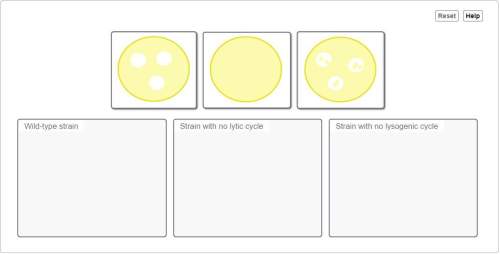
Biology, 31.10.2019 06:31 naomicervero
Phage are viruses that must infect bacteria to reproduce. viral genomes do not contain all the genes needed to produce all proteins necessary for dna replication, rna transcription, and protein translation; instead the viruses force bacterial proteins and enzymes to express phage genes instead of bacterial genes.
phage are very adaptable, and their behavior depends on whether conditions are favorable or unfavorable for making more phage.
when bacteria are plentiful (favorable conditions), viral dna within the bacteria remains separate from the bacterial chromosome, and the virus forces the bacteria to make more virus. when the amount of virus becomes too much for the cell to hold, the membrane ruptures, and viruses are released to infect surrounding bacteria. this is known as the lytic cycle.
when bacteria are scarce (unfavorable conditions), the viral dna within the bacteria becomes integrated into the bacterial chromosome. the bacteria survive and are still able to reproduce; viral dna is transmitted to daughter cells when the bacteria reproduces. this is known as the lysogenic cycle.
part a
as you just read, phage depend on bacteria to reproduce. phage can be maintained by infecting a culture of bacteria with a strain of phage, and then plating the bacteria on an agar plate to grow.
suppose that you isolate two mutant strains of phage - one strain cannot enter the lytic cycle and the other strain cannot enter the lysogenic cycle. you also grow wild-type phage as a control. you see three different phenotypes:
a plate with no missing bacteria- the lawn of bacteria is intact
a plate with spots/circles (called plaques) where there are absolutely no bacteria in the circles
a plate with spots/circles (called plaques) where there are some bacteria in the center of the circles.
based on what you know about what happens in each cycle, match the plating results with the identity of the strain.
drag each plate into the correct category.


Answers: 1


Another question on Biology

Biology, 22.06.2019 00:30
Which type of scientific statement is defined as a hypothesis or group of hypotheses that can be accepted as true based on the repeated experimentation with similar results
Answers: 3

Biology, 22.06.2019 03:00
Sediment layers stop lateral spreading when: they encounter a barrier they encounter an opposing current they run out of additional sedimentary material
Answers: 2

Biology, 22.06.2019 09:00
Dan made the table shown to describe two different relationships between animals. organism interactions relationship a relationship b one organism lives inside the organism it feeds off no organism is harmed which of the following statements is most likely correct?
Answers: 1

Biology, 22.06.2019 09:30
Laura yin suggested i contact you concerning the marketing position available at eastern arbor. i am inspired to pursue my marketing interests at eastern arbor due its reputation as a prestigious innovative and growing company in liability policies
Answers: 1
You know the right answer?
Phage are viruses that must infect bacteria to reproduce. viral genomes do not contain all the genes...
Questions




History, 21.05.2021 17:20

Mathematics, 21.05.2021 17:20


Mathematics, 21.05.2021 17:20

Mathematics, 21.05.2021 17:20


Mathematics, 21.05.2021 17:20

Spanish, 21.05.2021 17:20

Mathematics, 21.05.2021 17:20

Mathematics, 21.05.2021 17:20




Mathematics, 21.05.2021 17:20

Mathematics, 21.05.2021 17:20


Mathematics, 21.05.2021 17:20



